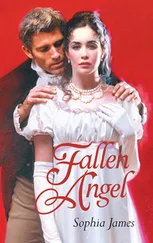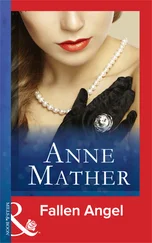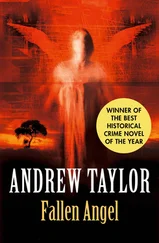Robert Sawyer - Fallen Angel
Здесь есть возможность читать онлайн «Robert Sawyer - Fallen Angel» весь текст электронной книги совершенно бесплатно (целиком полную версию без сокращений). В некоторых случаях можно слушать аудио, скачать через торрент в формате fb2 и присутствует краткое содержание. Год выпуска: 1997, ISBN: 1997, Издательство: ShadowLands Press / Bereshith Publishing, Жанр: Фантастика и фэнтези, на английском языке. Описание произведения, (предисловие) а так же отзывы посетителей доступны на портале библиотеки ЛибКат.
- Название:Fallen Angel
- Автор:
- Издательство:ShadowLands Press / Bereshith Publishing
- Жанр:
- Год:1997
- ISBN:1-930595-00-X
- Рейтинг книги:5 / 5. Голосов: 1
-
Избранное:Добавить в избранное
- Отзывы:
-
Ваша оценка:
- 100
- 1
- 2
- 3
- 4
- 5
Fallen Angel: краткое содержание, описание и аннотация
Предлагаем к чтению аннотацию, описание, краткое содержание или предисловие (зависит от того, что написал сам автор книги «Fallen Angel»). Если вы не нашли необходимую информацию о книге — напишите в комментариях, мы постараемся отыскать её.
. A young circus performer fears falling.
Finalist for the Bram Stoker Award for Best Short Story of the Year, and one of three stories cited as “highlights” from this the anthology by the Denver
Fallen Angel — читать онлайн бесплатно полную книгу (весь текст) целиком
Ниже представлен текст книги, разбитый по страницам. Система сохранения места последней прочитанной страницы, позволяет с удобством читать онлайн бесплатно книгу «Fallen Angel», без необходимости каждый раз заново искать на чём Вы остановились. Поставьте закладку, и сможете в любой момент перейти на страницу, на которой закончили чтение.
Интервал:
Закладка:
Fallen Angel
by Robert J. Sawyer
Angela Renaldo never knew if it was an act of homage or of defiance—whether it was the ultimate show of faith in God, or whether it was tantamount to flipping the bird at the Almighty.
Carlo, the eldest of her five brothers, doubtless had an opinion. From his position, planted firmly on the ground, near the bleachers, hands resting on the gray rubber rims of the twin wheels that propelled him along, there could be no doubt. God had enough to keep Himself busy looking after regular folk; He had no time for those who deliberately tempted fate.
Angela, the youngest Renaldo child, loved Carlo; she didn’t love all her brothers, but her affection for Carlo was pure. He was the only one who had played catch with her, the only one who had listened to her, the only one who never seemed to mind her being around.
Now, of course, things were different. Now, Carlo didn’t play catch with anyone. He just sat in his chair, almost never looking up.
There was nothing to fear, Poppa always said. We’ll be so high up that we’ll catch God’s eye.
The high wire ran for ten meters, three stories above the crowd, below the peaked apex of the big top. Guys along the wire’s length anchored it to the ground, preventing it from swaying, minimizing its sagging. A ladder at one end gave access to the high wire; atop the ladder were three platforms, one above another.
Poppa left the lower platform first, a twenty-kilogram balancing pole in his arms, a shoulder brace supporting an aluminum crossbar that stuck out a meter and a half behind him. The crossbar ended in another shoulder brace, and Franco, the youngest son, donned that, following his father out onto the wire, a wire no thicker than Franco’s index finger, his own balancing pole held underhand in front of him.
And then Momma stepped from the middle platform, walking onto the crossbar that was supported by the shoulders of her husband and her son, her own balancing pole gripped in her hands. And on her shoulders rested another brace, with a second crossbar stretching behind her.
Poppa and Franco inched their way across, locked together, the length of their crossbar setting the distance between them. Neither man looked down at the ground, nor up at Momma, whose weight was distributed across their shoulders. Step, and step again. In unison. An incremental dance.
Once Franco was far enough from the lower platform, Dominic started across the high wire behind him, a third crossbar supported by his shoulders. Antonio donned the shoulder brace at the opposite end of that crossbar, and followed Dominic onto the wire.
Mario, on the middle platform, stepped off, making his way along the crossbar supported by Antonio and Dominic, just as his mother had done for the one supported by Poppa and Franco. When Mario was far enough out, he put the yoke from his mother’s crossbar on his shoulders.
Below, the crowd was spellbound—ten thousand mouths agape, staring at the spectacle of six people balancing on the high wire, four on the bottom supporting two more above.
And then—
And then it was Angela’s turn.
Angela, the only daughter, the youngest, stepped gingerly off the highest of the three platforms and inched her way across the upper crossbar, supported between her Momma and Mario.
Angela had her own twenty-kilo balancing beam, and—
The audience is amazed.
—and a metal chair.
She’s holding a metal chair, its four legs joined by thin metal bars at the base in an open square, and she proceeds to balance this square perfectly on the crossbeam, and then—
The audience goes nuts. They’ve never seen anything like this. They can’t believe it’s possible; it defies all reason, all physics—
And then Angela climbs onto the chair, still holding her balance beam, and suddenly, incredibly, fantastically, the seven-person pyramid is complete: four members of her family on the bottom, two more in the next layer, and her, little Angela, balancing on a chair supported by a crossbar no thicker around than her tiny wrist, above them all, the whole incredible thing a feat of engineering at least as great as its namesakes at Giza.
The cheering of the crowd is thunderous, tumultuous.
It’s almost enough to drown out the pounding of Angela’s heart.
Angela was fifteen years old, blond, thin—but not too thin. Poppa said the audience liked to see curves on a girl: give the divorced fathers something to look at while their kids enjoyed the spectacle. Sometimes, thought Angela, Poppa looked at her in that way, too.
He must have known it was wrong, she thought. She didn’t get regular schooling—the circus tutor taught her, five hours a day if they were in a jurisdiction that required that much; less, if the show had traveled to places with laxer rules—but she heard tell from kids who visited the circus of the kinds of things they were learning in normal schools. Things about how to protect yourself; things about making choices for the future.
But Angela had no choice; her future was preordained. She was a Renaldo—one of the Amazing Aerial Renaldos, the star attraction of Delmonico’s Razzle and Dazzle Circus. And the Renaldos were a family act; none of Poppa’s children had ever left. Instead, they trained day after day, from as soon as they could walk, learning not to misstep (lest Poppa slam their ankles with a stick), learning not to fear heights, learning to move with grace, until they were ready to tackle the high wire, to do stunts far above the ground, with no net—never a net, except when they were in New York, where a state law required one; Poppa said he was never so ashamed in his life as when they performed in New York.
No, the Renaldo kids had to stay. Poppa needed them. Who else could he trust? Who else could any of them trust? A trick like this, it required family.
They did the pyramid every day—and every day it terrified Angela. She’d position the chair just so, balancing it perfectly on the brace—for the only alternative to perfection was death—and then clamber up. She could feel the chair sway back and forth as she stood up on it, but the pyramid always held, a pyramid of flesh and metal, fifteen meters above the cheering crowd.
She hated every moment of it—hated the way her heart pounded, like a jackhammer. Hated feeling as though bats were gyrating in her stomach. Hated the overwhelming fear that she would fall, that she would end up like Carlo, who was watching and not watching far, far below.
She couldn’t leave; she couldn’t run away. She had to stay, and not just because it was a family act. She had to stay to look after Carlo. Franco, Dominic, Mario, and Antonio made little time for Carlo; he was an unpleasant reminder of what could go wrong. And Momma and Poppa felt too much guilt to really love him. So Angela took care of him, loving him, and fearing that she might end up like him.
The being came to her in a dream, as all beings whose visits could never be proven must.
He wasn’t as she’d expected. Oh, she knew who he was—who he must be; the Renaldos were Catholic, and Sunday mornings they always found a mass to attend. Each week a different city, a different church but, presumably, the same God.
Yes, she knew who this must be. But he looked unlike any drawing of him she’d ever seen. Indeed, he looked like a clown. But not Yuri or Pablo or Gunter or any of the other clowns who worked here at Delmonico’s; it was no clown she had ever seen before. But his face was painted white, except for rims of red makeup—no, no, of naked red skin—around his dark, burning eyes.
Some children who came to the circus were frightened of clowns, their parents dragging them despite wailed protests to see the harlequins, as if the parents knew better, as if they were sure the fear their children felt was nonsensical. But children knew .
Читать дальшеИнтервал:
Закладка:
Похожие книги на «Fallen Angel»
Представляем Вашему вниманию похожие книги на «Fallen Angel» списком для выбора. Мы отобрали схожую по названию и смыслу литературу в надежде предоставить читателям больше вариантов отыскать новые, интересные, ещё непрочитанные произведения.
Обсуждение, отзывы о книге «Fallen Angel» и просто собственные мнения читателей. Оставьте ваши комментарии, напишите, что Вы думаете о произведении, его смысле или главных героях. Укажите что конкретно понравилось, а что нет, и почему Вы так считаете.











